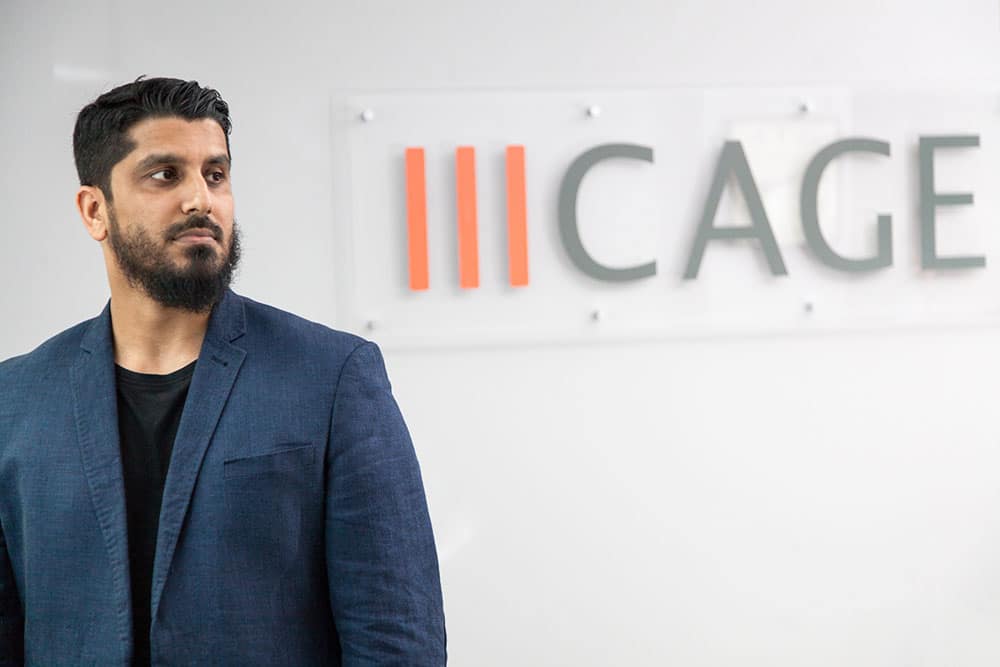London - A High Court judge yesterday rejected CAGE international director Muhammad Rabbani’s appeal, missing a crucial opportunity to review the deeply intrusive and draconian nature of the controversial Schedule 7 power. Judge Irwin said that the judgement in the Miranda case pertained to Article 10 for journalists, but did not extend to other special procedure material.
Having successfully protected testimony by Ali Al-Marri implicating high-ranking US officials in torture, Rabbani will continue to pursue his appeal to the Supreme Court, further challenging Schedule 7 powers. Since the publication of the information he was protecting, arrest warrants are being pursued across several jurisdictions for the immediate apprehension of the alleged torturer.
Muhammad Rabbani, CAGE International Director, said: “I knew at the time when I refused my passwords that I could be sent to prison. I remain convinced that preserving the principle of protecting torture survivors is the right thing even if it carries penalties according to the law. What should concern judges and lawyers is that such a power as Schedule 7 exists in the first place - one that does not respect due process norms and can land an innocent person in prison for merely protecting privileged or confidential data.” “Schedule 7 powers are draconian and intrusive, violating the personal and professional privacy of every doctor, lawyer, human rights defender, banker, business owner, or psychiatrist that is stopped at UK borders without suspicion. There is nothing like it anywhere else in the Western world. Data collected from phones and laptops are routinely shared with GCHQ and beyond.” “The conclusion of this latest appeal sets a dangerous precedent. It now means that privileged material carried by lawyers, human rights advocates, NGO workers and others is not safe, and trying to protect such information can now result in a ‘terrorism’ conviction. We will be appealing this at the Supreme Court.” Ends] Press enquiries: [\press@cageuk.org
<p id="m_9093301621124910827docs-internal-guid-6f8df98d-631e-a301-6d55-f35951bbdb5b" dir="ltr">London - A High Court judge yesterday rejected CAGE international director Muhammad Rabbani’s appeal, missing a crucial opportunity to review the deeply intrusive and draconian nature of the <a href="http://www.passwithprivacy.com">controversial Schedule 7 power</a>. Judge Irwin said that the judgement in the Miranda case pertained to Article 10 for journalists, but did not extend to other special procedure material.</p>
<p dir="ltr">Having successfully protected testimony by Ali Al-Marri <a href="https://www.cage.ngo/35000-pages-of-evidence-implicating-named-us-federal-agents-in-torture-on-us-soil">implicating high-ranking US officials</a> in torture, Rabbani will continue to pursue his appeal to the Supreme Court, further challenging Schedule 7 powers. Since the publication of the information he was protecting, <a href="https://www.cage.ngo/south-african-lawyers-to-seek-arrest-of-federal-agents-involved-in-unprecedented-us-torture-case">arrest warrants are being pursued</a> across several jurisdictions for the immediate apprehension of the alleged torturer.</p>
<strong>Muhammad Rabbani, CAGE International Director, said:</strong>
“I knew at the time when I refused my passwords that I could be sent to prison. I remain convinced that preserving the principle of protecting torture survivors is the right thing even if it carries penalties according to the law. What should concern judges and lawyers is that such a power as Schedule 7 exists in the first place - one that does not respect due process norms and can land an innocent person in prison for merely protecting privileged or confidential data.”
“Schedule 7 powers are draconian and intrusive, violating the personal and professional privacy of every doctor, lawyer, human rights defender, banker, business owner, or psychiatrist that is stopped at UK borders without suspicion. There is nothing like it anywhere else in the Western world. Data collected from phones and laptops are routinely shared with GCHQ and beyond.”
“The conclusion of this latest appeal sets a dangerous precedent. It now means that privileged material carried by lawyers, human rights advocates, NGO workers and others is not safe, and trying to protect such information can now result in a ‘terrorism’ conviction. We will be appealing this at the Supreme Court.”
[Ends]
<strong>Press enquiries:</strong>
<a href="mailto:press@cageuk.org" target="_blank" rel="noopener">press@cageuk.org</a>










